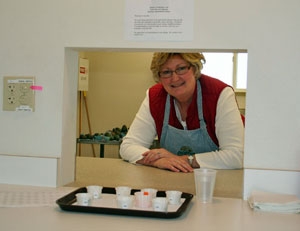
“We think the flavor of mandarins declines much more rapidly than oranges,” said Sue Collin, a UC Riverside staff research associate who is based at the UC Kearney Agricultural Research and Extension Center in Parlier.
The way oranges are set out at the grocery store or on home counter tops could be trouble for the more delicate mandarin. And when mandarins make a six-week sea voyage to the Pacific Rim, will Asian consumers find the fruit acceptable?
In order to provide farmers, shippers and retailers accurate information about the impact of different storage temperatures on the quality of the fruit, Collin is working with UC Riverside sub-tropical horticulturalist Mary Lu Arpaia and USDA plant physiologist Dave Obenland to understand the changes in mandarins stored at a variety of temperatures, at different humidity levels, for various periods of time.
“A grocery store may be holding fruit at room temperature, 68 degrees or even warmer,” Collin said. “We’re comparing fruit that has been stored in very controlled atmospheres – at temperatures in the 40s, 50s and 60s.”
When it comes to understanding the acceptability of fresh fruit, nothing can match the human palette.
Collin recruits staff based at Kearney to take a break from their jobs to come to a laboratory built at the agricultural research station specifically for sensory testing. The 1,100-square-foot laboratory features neutral white paint and broad-spectrum lighting. The ventilation system was designed to minimize distracting odors. Inside, six tasting booths each have small windows that open to the kitchen area, where samples are prepared.
“We do quite a bit of testing to see if our volunteers can tell the difference in fruit stored at different temperatures,” Collin said.
In conjunction with the human testing, Obenland studies the fruit’s chemical composition to find out if objective numerical values correlate with the more subjective findings of the human tasters.
Although the optimal storage temperature for mandarins is still under investigation, Collin suggested consumers should keep their mandarins in the refrigerator at home for best results.
“I think the flavor holds better and the fruit lasts longer in the refrigerator,” Collin said.
This research is being funded in part by the Citrus Research Board.
Attached Files: